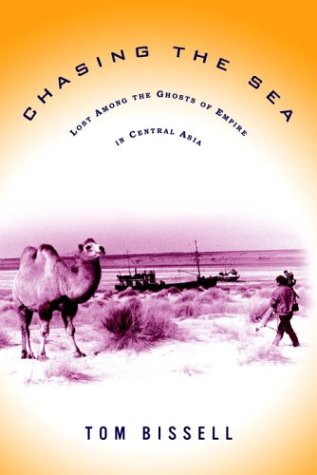
Disappearance of Aral Sea leads Uzbekistan RPCV Tom Bissell on trail of discovery
Disappearance of Aral Sea leads author on trail of discovery
Monday, January 26, 2004
A burning fascination with central Asia led Escanaba native Tom Bissell to join the Peace Corps in Uzbekistan, but he came back early and sick. The region stayed on his radar, though, and the result is a remarkably good book, "Chasing the Sea: Lost Among the Ghosts of Empire in Central Asia" (Pantheon, 406 pages, $24.95), published late last year to a highly appreciative audience.
Last fall Bissell was in Ann Arbor promoting the book, and this week he will return at 3:30 p.m. Tuesday to discuss it at the University of Michigan International Institute, 1080 S. University Ave. His second appearance here is co-sponsored by the U-M Program in the Environment and the Center for Russian and East European Studies. In the speech, Bissell plans to talk about the origins, effects and lessons of the Aral Sea ecological disaster, in which a body of water once the size of Lake Michigan was drained to grow cotton on the desert.
In a phone interview from his New York City home, the 30-year-old Bissell noted that the hoopla surrounding publication of his book and his subsequent national tour is mostly finished. He is pleased to get another chance to talk about the book, especially at U-M.
"They're academics," he said. "They don't give a damn about topicality. And I say that with admiration."
The book, an expansion of an article Bissell wrote for Harper's magazine in 2002, tells how irrigation policies of the former Soviet Union caused the Aral Sea to dry up, wiping out fish species and halting migration of millions of birds. It also portrays Uzbekistan, including history, politics and economics, and Bissell's journeys there with an interpreter named Rustam as the two make their way toward the shores of the devastated sea.
Bissell lasted only several months in the Peace Corps in Uzbekistan. Sick and unhappy, he left. Bissell told me he had long been obsessed with central Asia. Even after leaving the Peace Corps, he couldn't stop thinking about the country.
"The further I got from the experience of washing out - which I wanted to forget - I still had the obsession," he said. "It's hard to get an assignment writing about a part of the world no one knows about, so the Aral Sea became my reason to get back there."
The book received strong reviews and Bissell said sales were "totally satisfying." Readings across the country attracted a "weird cross-section of people," he said. "There were some older people, some who like travel and some hardier, braver sorts who wanted to go to Uzbekistan. There were some granola types, too."
Are there any disasters in the United States that remind Bissell of the Aral Sea disaster? "Not really," he said. "There is some much, much smaller stuff happening out West, with golf courses drying up around Phoenix. But I don't think the United States has anything to compare. We don't have a totalitarian government here, and when something goes wrong, people complain."
For example, when Lake Erie was dying in the 1960s and early '70s, people complained and a cleanup was undertaken, Bissell said. "Today, Erie is one of the cleanest Great Lakes. It's a shame the Aral Sea wasn't the beneficiary of such attention and conservation."
"Chasing the Sea" will come out in paperback in the fall. Early next year, look for "Death Defier," Bissell's collection of short stories set in central Asia.
In April, his magazine piece about traveling to the Canadian Arctic will appear in Harper's. "It's a private, literary piece, about being by yourself in a weird part of the world when the world seems to be going crazy," he said. He also is working on a piece about Vietnam for GQ magazine.
Meanwhile, central Asia remains very much on his mental radar, for reasons of history and current international politics.
"Sept. 11, probably the most important geopolitical event of the last 40 years, was hatched in the caves of central Asia," he said. "We ignore that part of the world at our peril."
